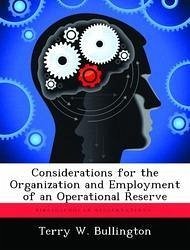
A New Operational Reservist for the New Operational Reserve
Versandkostenfrei!
Versandfertig in über 4 Wochen
14,99 €
inkl. MwSt.

PAYBACK Punkte
7 °P sammeln!
The 2006 Quadrennial Defense review has mandated Reserve Component Operationalization. The high cost of manpower, combined with the absolute requirement of funding operations, leaves each service little funds for recapitalizing (modernizing) their equipment. Relieving the overwhelming burden personnel places upon service budgets makes it very appealing for the Department of Defense to "cash in" on reserve forces by using them in an increasing operational capacity. Making a reserve force that is operational as well as strategic, however, is difficult because of several legal and logistical prob...
The 2006 Quadrennial Defense review has mandated Reserve Component Operationalization. The high cost of manpower, combined with the absolute requirement of funding operations, leaves each service little funds for recapitalizing (modernizing) their equipment. Relieving the overwhelming burden personnel places upon service budgets makes it very appealing for the Department of Defense to "cash in" on reserve forces by using them in an increasing operational capacity. Making a reserve force that is operational as well as strategic, however, is difficult because of several legal and logistical problems posed by the "strategiconly"nature of U.S. Codes Title 10 and Title 32.This paper is an executive summary analysis of critical issues pertinent to amending U.S. Code Titles 10 and 32. It does not attempt to propose the exact wording for new legislation, but is rather an analysis of limitations currently imposed by Titles 10 and 32 with respect to operationalization and the effects of these practices on Guardsmen and Reservists and their employers. Looking at the needs of the services, reservists/guardsmen, and their employers, this analysis explores the benefit and pitfalls of operationalization through the adaptation of "operational" reserve units and "operational" reservists/guardsmen. This analysis indicates that legally defined "operational" reserve units and "operational" reservists, in addition to a "strategic" reserve, has the potential to improve force efficiency, and concludes that in order to make this sustainable, a new social compact that guarantees a level of predictably for all involved is required. This work has been selected by scholars as being culturally important, and is part of the knowledge base of civilization as we know it. This work was reproduced from the original artifact, and remains as true to the original work as possible. Therefore, you will see the original copyright references, library stamps (as most of these works have been housed in our most important libraries around the world), and other notations in the work. This work is in the public domain in the United States of America, and possibly other nations. Within the United States, you may freely copy and distribute this work, as no entity (individual or corporate) has a copyright on the body of the work. As a reproduction of a historical artifact, this work may contain missing or blurred pages, poor pictures, errant marks, etc. Scholars believe, and we concur, that this work is important enough to be preserved, reproduced, and made generally available to the public. We appreciate your support of the preservation process, and thank you for being an important part of keeping this knowledge alive and relevant.














